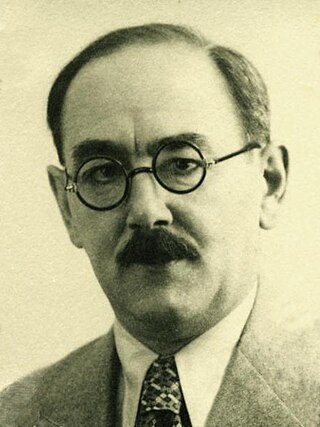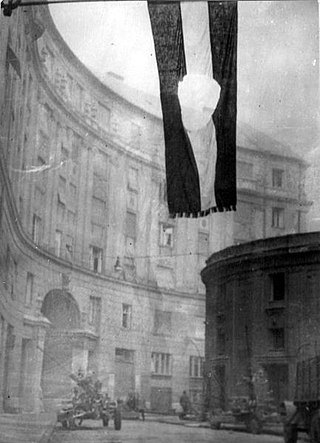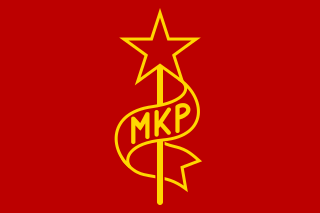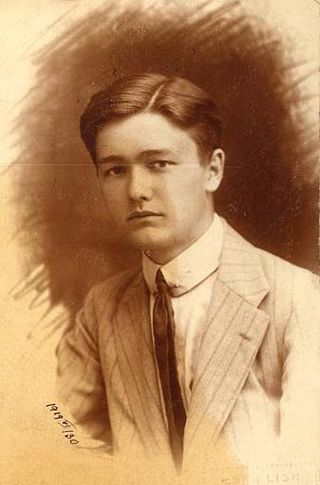
Imre Nagy was a Hungarian communist politician who served as Chairman of the Council of Ministers of the Hungarian People's Republic from 1953 to 1955. In 1956 Nagy became leader of the Hungarian Revolution of 1956 against the Soviet-backed government, for which he was sentenced to death and executed two years later.

The State Protection Authority was the secret police of the People's Republic of Hungary from 1945 to 1956. The ÁVH was conceived as an external appendage of the Soviet Union's KGB in Hungary responsible for supporting the ruling Hungarian Working People's Party and persecuting political criminals. The ÁVH gained a reputation for brutality during a series of purges but was gradually reined under the government of Imre Nagy, a moderate reformer, after he was appointed Prime Minister of Hungary in 1953. The ÁVH was dissolved by Nagy's revolutionary government during the Hungarian Revolution of 1956 and succeeded by the Ministry of Internal Affairs III.

The Hungarian Revolution of 1956, also known as the Hungarian Uprising, was a countrywide revolution against the government of the Hungarian People's Republic (1949–1989) and the policies caused by the government's subordination to the Soviet Union (USSR). The uprising lasted 12 days before being crushed by Soviet tanks and troops on November 4, 1956. Thousands were killed and wounded and nearly a quarter-million Hungarians fled the country.

János József Kádár, born János József Czermanik, was a Hungarian communist leader and the General Secretary of the Hungarian Socialist Workers' Party, a position he held for 32 years. Declining health led to his retirement in 1988, and he died in 1989 after being hospitalized for pneumonia.

László Rajk was a Hungarian Communist politician, who served as Minister of Interior and Minister of Foreign Affairs. He was an important organizer of the Hungarian Communists' power, but he eventually fell victim to Mátyás Rákosi's show trials.

Károly Grósz[ˈkaːroj ˈɡroːs] was a Hungarian communist politician, who served as the General Secretary of the Hungarian Socialist Workers' Party from 1988 to 1989.

The Hungarian Communist Party, known earlier as the Party of Communists in Hungary, was a communist party in Hungary that existed during the interwar period and briefly after World War II.

Robert Ardrey was an American playwright, screenwriter and science writer perhaps best known for The Territorial Imperative (1966). After a Broadway and Hollywood career, he returned to his academic training in anthropology and the behavioral sciences in the 1950s.

The Hungarian People's Republic was a one-party socialist state from 20 August 1949 to 23 October 1989. It was governed by the Hungarian Socialist Workers' Party, which was under the influence of the Soviet Union. Pursuant to the 1944 Moscow Conference, Winston Churchill and Joseph Stalin had agreed that after the war Hungary was to be included in the Soviet sphere of influence. The HPR remained in existence until 1989, when opposition forces brought the end of communism in Hungary.
Goulash Communism, also commonly called Kádárism or the Hungarian Thaw, is the variety of socialism in Hungary following the Hungarian Revolution of 1956. János Kádár and the Hungarian People's Republic imposed policies with the goal to create high-quality living standards for the people of Hungary coupled with economic reforms. These reforms fostered a sense of well-being and relative cultural freedom in Hungary with the reputation of being "the happiest barracks" of the Eastern Bloc during the 1960s to the 1970s. With elements of regulated market economics as well as an improved human rights record, it represented a quiet reform and deviation from the Stalinist principles applied to Hungary in the previous decade.

Hungarian–Soviet relations were characterized by political, economic, and cultural interventions by the Soviet Union in internal Hungarian politics for 45 years, the length of the Cold War. Hungary became a member of the Warsaw Pact in 1955; since the end of World War II, Soviet troops were stationed in the country, intervening at the time of the Hungarian Revolution of 1956. Starting in March 1990, the Soviet Army began leaving Hungary, with the last troops being withdrawn on June 19, 1991.

Zoltán Latinovits was a Hungarian actor.

György Aczél was a Hungarian communist politician. He became a member of the then illegal Hungarian Communist Party in 1935, and was a founding member of the Political Committee of the Hungarian Socialist Workers' Party in 1956. He was a deputy minister from 1958 to 1967, later, as one of the leaders of the Party's Central Committee the most influential figure in socialist culture politics.

András Visky is a Hungarian-Romanian poet, playwright and essayist and the resident dramaturg at Cluj-Napoca Hungarian Theatre, Romania, where he also holds the position of associate artistic director. His plays have been staged in several countries including Romania, Hungary, France, Italy, Poland, Slovenia, England, Scotland and the United States. He has a DLA from the University of Theatre and Film, Budapest and since 1994 he has lectured at the Babeş-Bolyai University in the Department of Theatre and Television. He is one of the co-founders and the former executive director of Koinónia Publishing.

László Németh was a Hungarian dentist, writer, dramatist and essayist. He was born in Nagybánya the son of József Németh (1873–1946) and Vilma Gaál (1879–1957). Over the Christmas of 1925, he married Ella Démusz (1905–1989), the daughter of János Démusz, a keeper of a public house. Between 1926 and 1944 they had six daughters, but two of them died in infancy. In 1959 he visited the Soviet Union. In the last part of his life he lived and worked in Tihany. He died from a stroke on 3 March 1975 in Budapest and was buried in Farkasréti Cemetery, Budapest, where he shares a grave with his wife.

Antal Apró was a Hungarian Communist politician, who served as Speaker of the National Assembly of Hungary between 1971 and 1984.

Lajos Parti Nagy is a Kossuth Prize-winning Hungarian poet, playwright, writer, editor, critic, and one of the founding members of the Digital Literary Academy.

Plays of Three Decades is a collection of three plays by the prolific playwright, screenwriter, and science writer Robert Ardrey. The three plays included are Thunder Rock, Ardrey's international classic about hope and human progress; Jeb, Ardrey's post-World War II civil rights play about a black soldier returning from the Pacific; and Shadow of Heroes, a documentary drama about the prelude to and aftermath of the Hungarian Revolution of 1956. The last play resulted in the release of two political prisoners from Soviet custody.

Sing Me No Lullaby is a 1954 play by Robert Ardrey. It is about the treatment of accused communists in post-Cold War America. It was originally presented at the off-Broadway Phoenix Theatre in New York City.

Flóra Kádár was a Hungarian actress. She was known for her roles of Mrs. Hackl in the film Sunshine, Redl's sister in the film Colonel Redl, and Erzsi, Jóska's wife in the film Adoption.



















